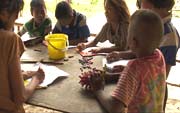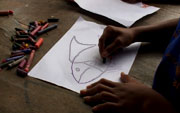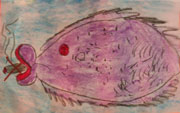- 4 ความเห็น
- แสดงความเห็น
- ติดต่อ
- Share

GIANNI MAIANI
|
| Mokens were the sole people to forecast the arrival of tidal waves |
Among the failure of systems and technologies of the "developed societies" there was an exception, constituted by a small ethnic minority: the Moken, also known as “Sea Gypsies”. The exception is surprising if one considers that Moken have adopted a very basic style of life, in antithesis with anything technological. All that they want and need is a boat for house and the sea as the “Country” where to live. The relationship between the Moken and the sea is so deep that among the generations they have adapted their eyes for a better and clear underwater vision. Without technologies, but with unrivalled knowledge of the sea, the Moken ran up to the hills of the islands immediately before the Tsunami of the 2004. How they could know? |
| May other Tsunami have hit the area in the past? |
Therefore, we had to find a old Moken that could eventually corroborate and confirm (or contradict) my idea. The main obstacle was related to the communication since Moken have their own language and there are not so many that can speak also Burmese or Thai. Anyway, with a bit of luck we found Chaleh: an elderly Moken able to speak a southern slang of Thai language. |
| Interview : Old Moken Chaleh talks about the Tsunami of December 2004 |
|
| Interview : Old Moken Chaleh talks about other experiences of Tsunami |
|
| Conclusions |
In addition, the ability of the Moken to forecast the arrival of Tidal waves may have been reinforced by direct and recent events: Tsunami that must be had quite violent (enough to generate fear in the Moken) but at the same time provoked by well localized telluric movements (while in the Tsunami of 2004 it was involved an exceptional movement of a whole plate along 1200 Km of faultline). |
|
Notes: sunset of a old culture? The Moken always considered their boats as their "houses" and the sea as their "Country". The relationship between the Moken and the sea is so deep that along the generations they have adapted their eyes to see better underwater. Refractory to concepts as "nation" or "border", the Sea Gypsies moved freely between the archipelagos of Andaman Sea, crossing the border between Myanmar and Thailand. The governments of those Countries are obviously not inclined to encourage "border crossing" in total freedom. While very little is known on Myanmar side (some sources reported persecutions on Moken from the military regime), in Thailand the Moken are subject to a census targeted to give them basic services as education and medical aid. We have visited an elementary school for Moken and we got a good impression: the management is left to volunteers that do their work with passion, and everything seems to be done with respect for the culture and the traditions of the Moken. But even good purposes have a price. Permanency slowly modifies the lifestyle of that ethnic minority. Even the unavoidable contact with other cultures (here including those represented by the tourists) makes the Moken more and more accustomed to the use of objects that apparently cannot be anything else than useful (engines, fins, underwater masks), but that in a slow and silent way end to erode capacities and skills built through centuries. The old Moken, who is one of the few left that still call his boat "my home", seems to be aware of the changes, as he expresses a resigned forecast about the next generations. |
 Moken elementary school |
 What a Moken child can draw? Among about fifty drawings, we did not see any with a subject different from the sea. |
 Education: a Moken child learnt that cigarettes are harmful to the health. Better to let it know also to parrot fishes before they start smoking. |